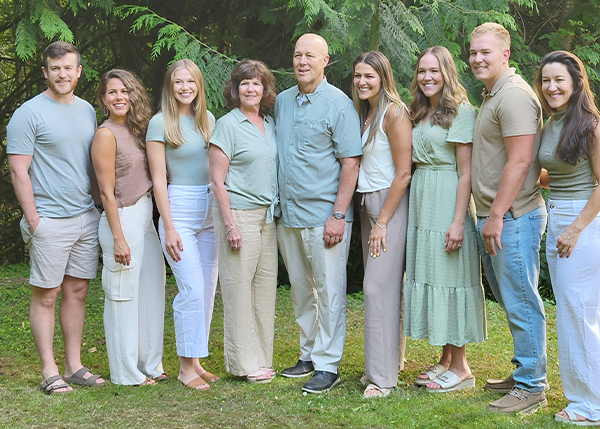Family means everything to Michelle Obert; that includes her nuclear family of husband John, to whom she has been married for 40 years, and seven children and five grandchildren; church family at St. Francis in Quincy and her work family of 40 years at Transitions of Western Illinois.
This story introduces Michelle’s newest ‘family’, the caregivers of Blessing Hospital.

What happened?
On June 2, 2025, Michelle and her sisters accompanied their 82-year-old mother (more family!) to Blessing Hospital where mom had a heart procedure called an ablation to correct AFib (Atrial Fibrillation), an irregular heartbeat.
Oddly enough, that same evening Michelle was home putting away groceries when her own heart began to race. Her Apple watch recorded her heart rate at 180 beats per minute, nearly three times the average resting heart rate for a woman of her age in good health.
Michelle was surprised.
“I’ve had a high heart rate before, usually after exercise, and it always comes down,” she said. “This one would come down and go right back up.”
Family to the rescue
Michelle’s 21-year-old son, Nolan, was home at the time and encouraged his mother to go to the Blessing Hospital Emergency Center. But Michelle wasn’t sure.
“He was a little mad that I was not going earlier. I just kept thinking, ‘Let me rest and eat something.”
The last time Michelle was a patient at the hospital was 21-years before, when Nolan was born. But at his urging, and after an hour-and-a-half of unrelenting symptoms, Michelle went to the Emergency Center.
“I expected to be seen and be sent home.”
Instead, Michelle was given the medication Adenosine. It blocks electrical signals that cause irregular heart rhythms, the effects of which some people describe as ‘feeling like a donkey kicked you in the chest.’ She required two doses of Adenosine to begin calming her erratic heartbeat.
While Michelle’s heart responded to the medication, she needed more care after further assessment. Her tachycardia, a general term referring to any heart rate over 100 beats per minutes, was diagnosed as AFib, a specific type of irregular heartbeat centered in the heart’s upper chambers.
Michelle was admitted to the hospital’s Progressive Care Unit. She received a different medication to see if it would address the AFib. If not, she would need a procedure called cardioversion, a treatment using quick, low-energy shocks.
While she waited to see how her heart would respond, Michelle found another family - the caregivers of Blessing Hospital - including the Emergency Center and Progressive Care Unit teams.
“Everyone – doctors, nurses, CNAs, dietary and housekeeping – everyone who came into my room was so very helpful, present and polite. I had a very good experience. I felt very comfortable and thankful.”
“Working in the medical field is hard and everyone did a wonderful job.”
One more family weighs in
Another of Michelle’s families helped in her heart care, her church family. Father Steven Arisman from St. Francis visited Michelle in the Progressive Care Unit, performed the Anointing of the Sick sacrament, and within an hour of his visit, Michelle said her heart rate returned to normal.
“I definitely attribute the care I received from Blessing to coming out of my AFib episode, but also to my priest and God getting me through it.”
Michelle was discharged after an overnight stay at Blessing and now sees a cardiac nurse practitioner to manage her AFib.
Blessing Hospital is a nationally accredited Chest Pain Center. For more information on the heart care available, go to blessinghealth.org/heart.
